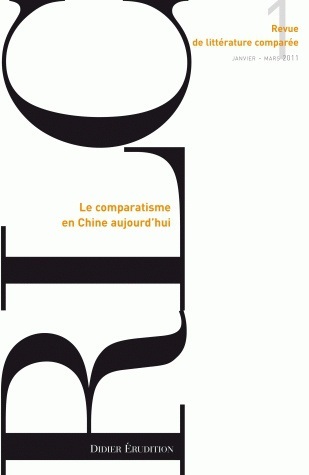- EAN13
- 9782252038093
- Éditeur
- Klincksieck
- Date de publication
- 9 avril 2011
- Collection
- Revue de littérature comparée
- Nombre de pages
- 128
- Dimensions
- 23 x 15 x 0,9 cm
- Poids
- 196 g
- Langue
- fre
- Langue originale
- eng
Revue De Littérature Comparée - N°1/2011, Le Comparatisme En Chine Aujourd'hui
Klincksieck
Prix public : 20,00 €
Résumé Introduction: MENG Hua, ZHANG Yinde Avec les contributions de: CHEN Dun, CHEN Sihe, DENG Yanyan, LIU Yan, MENG Hua, RAO Pengzi, SUN Jingyao, WANG Xiaolu, XIE Tianzhen, XU Xinjian, YAN Shaodang, YANG Huilin, YE Shuxian, YUE Daiyun, ZHANG Longxi, ZHANG Xiping. Ce numéro spécial dédié au comparatisme en Chine aujourd'hui est composé de quatorze contributions provenant des universitaires de la Chine continentale. Ces articles, répartis dans six sections, sont réunis pour en dresser un état des lieux en recouvrant les champs divers. Ils proposent d'abord une cartographie générale sur le territoire, la méthodo-logie et le positionnement qui caractérisent la littérature comparée en Chine par rapport à la configuration mondiale. Un second groupe de textes aborde les relations littéraires et culturelles diachroniques, à travers l'examen des écrits variés qui convoquent des approches historiques, « médiologiques » et imagolo-giques. Le domaine de la poétique comparée est illustré par deux articles qui portent, d'un côté, sur les interférences formelles entre les poésies classiques chinoise et japonaise et, de l'autre, sur les transferts notionnels dans le fonc-tionnement du discours critique. L'anthropologie fait l'objet aussi de deux con-tributions qui renvoient à la fécondité du champ : la littérature comparée, voire les études littéraires, recourent de plus en plus à une approche multidimensionnelle, encline à la confrontation de l'écrit, de l'oralité et des pratiques rituelles ; parallèlement le cas de James Legge donne lieu à des réflexions sur l'herméneutique occidentale et sur ses paradigmes révélateurs que constitue la traduction des classiques chinois. Trois articles sont focalisés sur le « Domaine » de la Chine dont ils révèlent les spécificités : ils mettent en avant un compara-tisme intérieur en interrogeant l'identité « chinoise » dans ses relations avec les cultures périphériques incarnées par les ethnies minoritaires ; ils esquissent le contour d'une littérature sinophone diasporique habitée par une tension identitaire et interculturelle forte ; ils soulignent des jeux d'aller-retour dans les échanges avec l'autre en développant en Chine les études sur la sinologie, telle qu'elle est née et pratiquée à l'étranger, notamment en Occident. Un dernier article, enfin, dresse un tableau synthétique sur l'enseignement de la littérature comparée en Chine, en évoquant son dispositif institutionnel et son élaboration pédagogique, au service de la transmission du savoir en matière des humanités et de la formation spécialisée. Panorama partiel et bilan provisoire, ce numéro invite à approfondir le champ du comparatisme chinois, qui implique un dialogue élargi et prolongé entre les travaux chinois et internationaux. Abstract Introduction by: MENG Hua, ZHANG Yinde Contributions by: CHEN Dun, CHEN Sihe, DENG Yanyan, LIU Yan, MENG Hua, RAO Pengzi, SUN Jingyao, WANG Xiaolu, XIE Tianzhen, XU Xinjian, YAN Shaodang, YANG Huilin, YE Shuxian, YUE Daiyun, ZHANG Longxi, ZHANG Xiping. This special issue, dedicated to Comparative Literature in China today, con-sists of fourteen contributions from universities in mainland China. These articles, arranged in six sections, are brought together to give the current situation of the discipline as well as the various fields of study within it. They propose at first a general cartography on the territory, the methodology and the positioning which characterize the comparative literature in China with regard to the world configuration. A second group of texts approaches the dia-chronic literary and cultural relations, through the examination of the varied pa-pers which convene historic, "mediologic" and imagologic approaches. The domain of the comparative poetic is illustrated by two articles which concern, on one side, the formal interferences between the Chinese and Japanese classic poetries and, on the other side, the notional transfers in the functioning of the critical speech. The anthropology is also the object of two contributions which refer to the fertility of the field: the comparative literature, even the literary studies, turn more and more to a multidimensional approach, inclined to comparison of the writing, of the orality and of the ritual practices; at the same time the case of James Legge gives rise to reflections on the western hermeneutics and on its revealing paradigms the translation of the Chinese classics constitute. Three articles are focused on the “Domain” of China of which they reveal specificities: they highlight an internal comparatism by questioning the “Chinese” identity in its relations with the peripheral cultures embodied by the minority ethnic groups; they sketch the outline of a Chinese diaspora literature lived by a strong identical and intercultural tension; they underline games of round trip in the exchanges with the other one by developing in China the studies on the sinology, such as she was born and practiced abroad, in particular in West. A last article, finally, draws up a synthetic picture on the education of the comparative literature in China, by evoking its institutional device and its educational elaboration, in the service of the transmission of the knowledge in the humanities and in the specialist training. This issue, although a partial overview and a provisional summary, hopes to deepen the field of Chinese Comparative Literature through a broad and pro-longed dialogue between studies in China with those in the rest of the world.


















